Results
-
£34.95
Iall Not Turn Back (Cornet and Euphonium Duet with Brass Band - Score and Parts) - Bosanko, Ivor
A setting of the challenging song with the words 'I'll not turn back, whatever it may cost'. Written as a duet for Cornet and Euphonium, but can be played by two Cornets or two Euphoniums.
Estimated dispatch 7-14 working days
-
£17.50
Iall Not Turn Back (Cornet and Euphonium Duet with Brass Band - Score only) - Bosanko, Ivor
A setting of the challenging song with the words 'I'll not turn back, whatever it may cost'. Written as a duet for Cornet and Euphonium, but can be played by two Cornets or two Euphoniums.
Estimated dispatch 7-14 working days
-
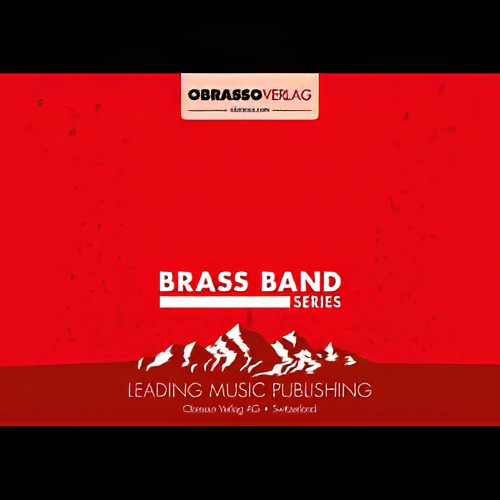 £54.20
£54.20Double Brass (Euphonium or Cornet and Euphonium Duet with Brass Band - Score and Parts) - Woodfield, Ray
Duet for Euphoniums or Cornet and Euphonium
Estimated dispatch 7-14 working days
-
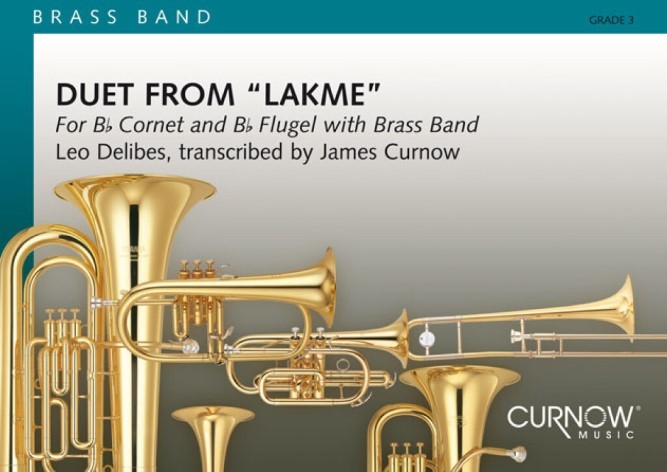 £45.99
£45.99Duet from Lakme (Cornet and Flugel Duet with Brass Band - Score and Parts) - Delibes, Leo - Curnow, James
Also known as Flower Duet from Lakme.Duration: 4:45
Estimated dispatch 7-14 working days
-
Duet For Two Cats - G. Rossini - Len Jenkins
"Duet For Two Cats" is often performed as an encore to vocal recitals and operatic galas. It may be sung by two sopranos, male-female pairs, or even as a tomcat duet and can be accompanied by a piano or a full orchestra. The lyrics are simple; the single word 'Miaow', repeated with various styles of inflexion and attitude throughout the piece. Our arrangement is for a cornet and trombone. The piece is generally ascribed to Rossini, though there is some doubt as to its actual origins and whether it is an authentic work by that composer. It is believed that an English composer, Robert Lucas Pearsall under the pseudonym G. Berthold may have assembled the various elements from Rossini and perhaps other composers into the piece as we now know it. In order to achieve the correct balance between band and soloists, there is a need to mute most of the band instruments. Recognising that not all bands will have the larger mutes which are expensive and sometimes unwieldy, we suggest a form of muting made famous by a jazz trumpeter and which works well on most instruments. It consists of a circle of heat resistant padded table covering or felt, slightly larger than the bell diameter, with an elasticated edge like a 'mop-hat'. With 3 holes in it to let the sound out, the mute is then simply stretched over the bell to achieve the desired effect and folded up when not required.
-
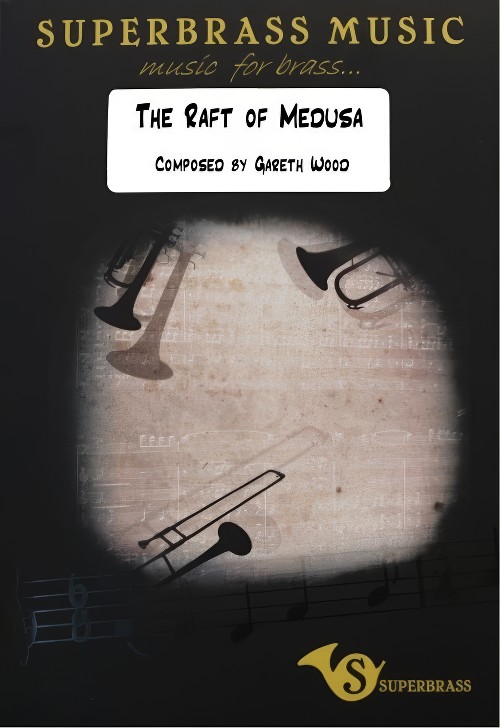 £43.00
£43.00The Raft of Medusa (Cornet and Trombone Duet with Brass Band - Score and Parts) - Wood, Gareth
The Raft of the Medusa is a painting by Theodore Gericault and hangs in the Louvre, Paris. It depicts the true story of a shipwreck and of a hastily constructed raft upon which at least 157 people were cast adrift for 13 days and endured starvation, dehydration, cannibalism and madness. The work is a diabolical duel between cornet and trombone, a violent tone poem showing off the techniques of the soloists. There is no light in this piece, no triumph, only sadness. Duration: 6.00. Suitable for Championship Section Bands
Estimated dispatch 7-14 working days
-
 £44.95
£44.95Meditation (from The Triumph of Time) (Flugel Horn and Baritone Duet with Brass Band - Score and Parts) - Graham, Peter
Meditation is the central theme from The Triumph of Time, a work commissioned for The Black Dyke Band by Music Director Nicholas Childs. The original brief was for a piece which would showcase the talents of the band's many fine soloists, among them Zoe Hancock on Flugel horn and Baritone soloist Katrina Marzella. This extract brings both instruments together in an extended stand-alone arrangement.Although scored for Flugel and Baritone, a number of options can be explored at the discretion of the conductor (eg. Flugel/Cornet and Euphonium/Trombone; two Bb Cornets etc. in which case cued lines in the Solo Horn and Soprano cornet parts may be played).Duration: 05:00
Estimated dispatch 7-14 working days
-
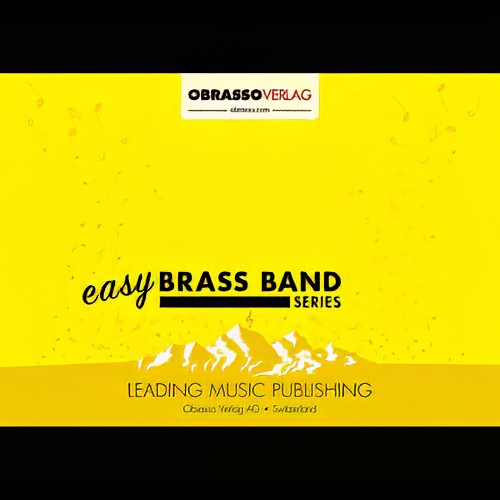 £50.90
£50.90Cocktails for Two (Cornet and Euphonium Duet with Brass Band - Score and Parts) - Jones, Spike - Woodfield, Ray
Slightly reduced Brass Band instrumentation (no rep cornet, no 2nd horn, no 2nd trombone part)
Estimated dispatch 7-14 working days
-
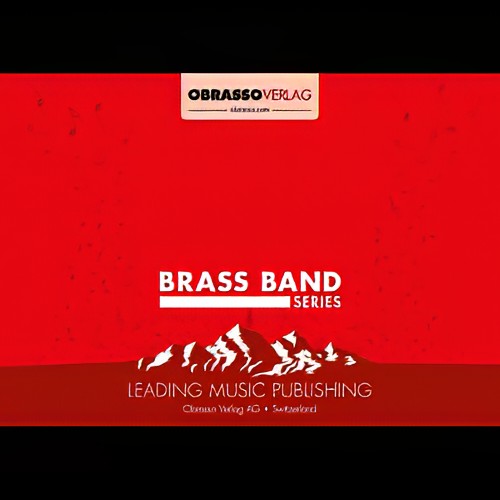 £50.90
£50.90In My Life (Cornet and Tenor Horn Duet with Brass Band - Score and Parts) - Lennon & McCartney - Fernie, Alan
This classic Lennon & McCartney tune is a perfect way to feature your Cornet and Tenor Horn players.
Estimated dispatch 7-14 working days
-
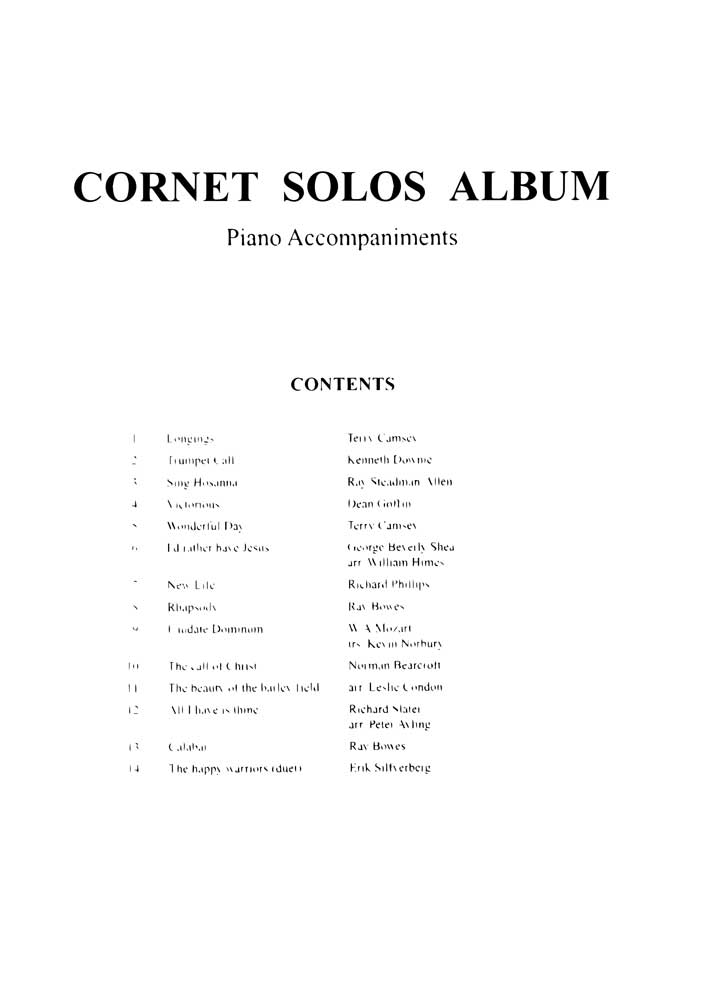 £24.95
£24.95Cornet Solos Album
Includes: Longings; Trumpet Call; Sing Hosanna; Victorious; Wonderful Day; I'd rather have Jesus; New Life; Rhapsody; Laudate Dominum; The call of Christ; The beauty of the barley field; All I have is thine; Calabar; The happy warriors (duet)Instrumentation: Cornet with Piano Accompaniment
Estimated dispatch 7-14 working days
